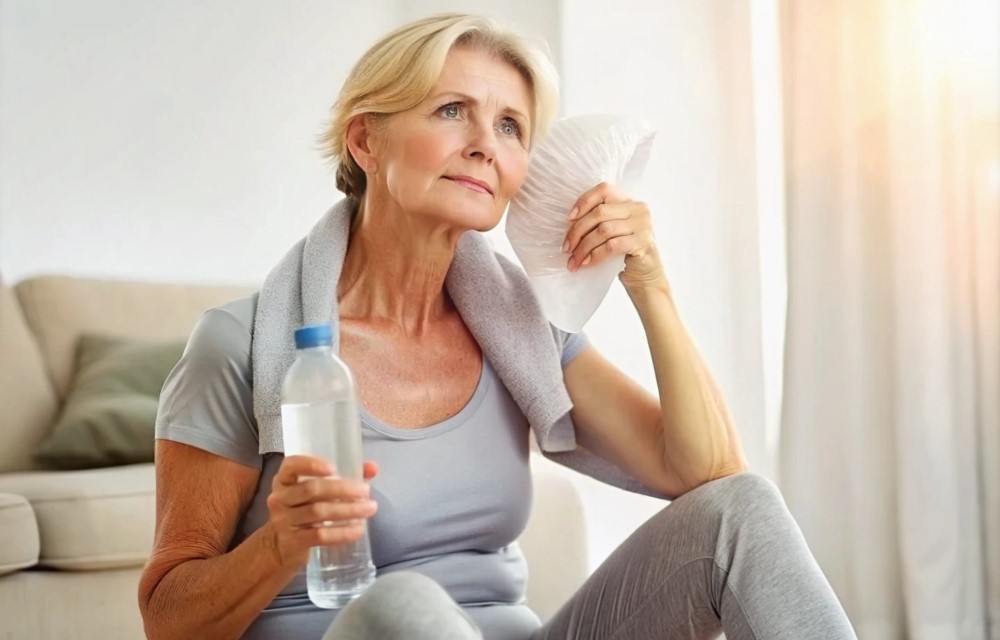It usually occurs between the ages of 40 and 50, although its onset and duration can be prolonged by about five years depending on the individual. Factors such as stress, smoking or certain gynaecological procedures can bring forward its onset or shorten its duration.
Although it is a natural process, this stage may involve changes which affect physical and emotional wellbeing.2 At Dexeus Midlife, we support each woman with personalised medical follow-up designed to understand this stage and take care of her holistic wellbeing.
What are the first symptoms of premenopause?
As oestrogen and progesterone hormone levels gradually decrease, the body begins to show the first symptoms of premenopause, a natural process that marks the beginning of a new stage. Below we review the 34 symptoms of premenopause.3
Physical symptoms
- Changes in the menstrual cycle
- Hot flushes and night sweats
- Breast pain or tenderness
- Muscle or joint pain
- Fatigue or a feeling of exhaustion
- Headaches or migraines
- Weight gain or loss
- Fluid retention or swelling
- Mild urinary incontinence
- Osteopenia or incipient osteoporosis
- Hair loss or weakness
- Skin changes
- Palpitations or mild arrhythmias
- Digestive changes
- Changes in cholesterol levels
Emotional and cognitive symptoms
- Mood swings and irritability
- Anxiety or nervousness
- Sadness or low mood
- Difficulty concentrating
- Forgetfulness or brain fog
- Insomnia or waking up at night
- Apathy or lack of motivation
- Decreased self-esteem
- Mental fatigue or lack of energy
Sexual and relationship symptoms
- Decreased sexual desire
- Vaginal dryness
- Pain or discomfort during sexual intercourse
- Difficulty maintaining intimacy or connection with your partner
- Decreased fertility
Less well-known but common symptoms
- Changes in smell or taste
- Dizziness and nausea
- Fragile or brittle nails
- Allergies or increased sensitivity
- More intense body odour
Would you like to speak to a team of experts?
You don’t have to go through it alone: we provide you with a specialised team to support you and enhance your quality of life in an innovative and personalised approach.
Why do symptoms vary among women?
This transition does not play out the same way for all women: the intensity, frequency and combination of premenopause symptoms depend on each person’s body, lifestyle and stage of life.¹
Some women only notice minor menstrual changes while others experience several symptoms at the same time. That’s why it’s important to have a personalised medical assessment to identify whether the changes are due to premenopause or other causes.
How can the onset of premenopause be identified?
Observing and recording changes in your cycle, sleep or mood can help you spot patterns and recognise the early signs of premenopause.¹
At Dexeus Midlife, we offer an online guidance test which will help you decide whether you might be in this phase or find out more precisely what stage you are at.
What treatments and solutions are available for premenopause?
Premenopause can be addressed from an integrative medical standpoint based on the type of symptoms and the individual needs of each woman.
Hot flushes and night sweats
These symptoms are treated through a personalised hormonal assessment and, when indicated, with hormone replacement therapy. Natural alternatives and lifestyle guidelines are also offered to reduce episodes and improve sleep.
Insomnia and fatigue
Sleep disturbances and persistent fatigue are addressed through personalised assessment and bespoke treatments, which may include hormonal adjustments, sleep recommendations and support from natural therapies.
Vaginal dryness and pain during intercourse
We offer regenerative gynaecology treatments such as vulvovaginal hydration with hyaluronic acid fillers, vaginal laser, platelet-rich plasma (PRP) or regenerative mesotherapy, which help restore elasticity and natural lubrication, along with pelvic floor physiotherapy when necessary.
Decreased libido
Decreased sexual desire is addressed holistically, combining hormonal, emotional and relational assessment. Intimate regenerative therapies coupled with natural therapies or hormone treatments can enhance intimate wellbeing and sexual satisfaction.
Weight gain and bloating
During this stage, metabolic changes may occur which alter the distribution of body fat. At Dexeus Midlife, we offer comprehensive assessment which combines gynaecology, nutrition and behavioural therapy, plus hormone or natural treatments based on individual needs.
Joint pain
Treatment includes medical assessment, adapted physical activity and in some cases physiotherapy or hormone treatment. The goal is to improve mobility and reduce inflammation.
Mood swings and memory loss
They are addressed with a combined cognitive, hormonal and emotional health approach. Psychological support, emotional education and hormonal adjustments can improve stability and mental clarity.
Skin and hair
Changes in skin and hair associated with hormonal variations can be addressed with hormone treatments, natural therapies and aesthetic and regenerative techniques, such as mesotherapy, microneedling or radiofrequency.
Holistic wellbeing
The symptoms of premenopause are part of a global process. Each case is thus addressed from a holistic perspective, seeking to strike a balance between hormonal, physical and emotional health.
To take care of your wellbeing in this new stage, you can ask for an appointment at the Dexeus Midlife centre. Our team, which specialises in all stages of menopause, delivers friendly, personalised care using safe and effective treatments.
References
¹ Dexeus Midlife – Premenopause, https://www.dexeus.com/midlife/salud-ginecologica/premenopausia/
2 MedlinePlus – Menopause, https://medlineplus.gov/spanish/menopause.html





